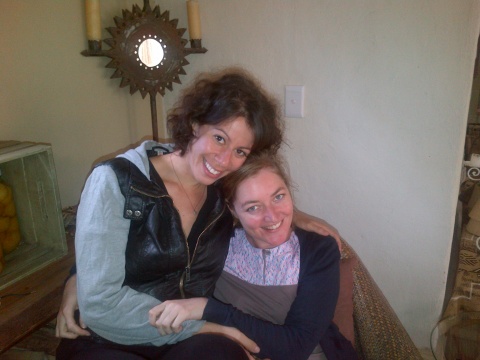
Day 2 has been a day of learning, fun and bonding here at Heath and Soul in Cape Town for the IkamvaYouth Team. It is true that when people put their minds together great things are sure to happen. The day started with a great ice breaker, where IkamvaYouth staff were taught how to breathe in and out whilst becoming one with nature and our surroundings. The NSPW facilitator, Ilana Wetzler, began to challenge the IkamvaYouth staff on how to understand themselves through self-awareness and highlighted the fact that we all should strive to develop our self-awareness so as to become better leaders.

Ilana- Facilitator(Left) and Joy -Co-Founder of IkamvaYouth (Right)
This year’s NSPW is full of experiential learning and we covered areas such as tools of dialogue, intentional misdirection and different types of energy. The IkamvaYouth team has been separated into three groups to complete team tasks. The names of the groups include the Rockets, the Sweet Chilli’s and the Bees.
Interestingly enough, Lungelo Masiza, the Chef preparing all the amazing food during our stay here is a former Ikamvanite. He has successfully started his own catering company called La-Thiswa catering and is a living testimony of how IkamvaYouth is changing and empowering lives.
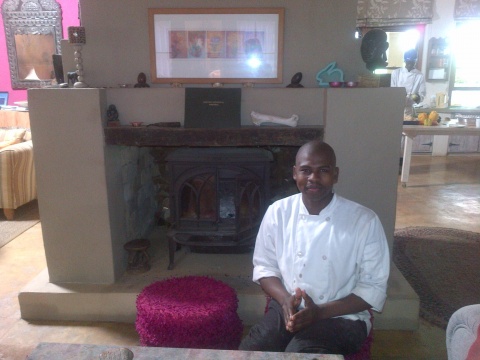
Watch out for the IkamvaYouth team of avengers, going through an amazing transformation from no fear to complete love!
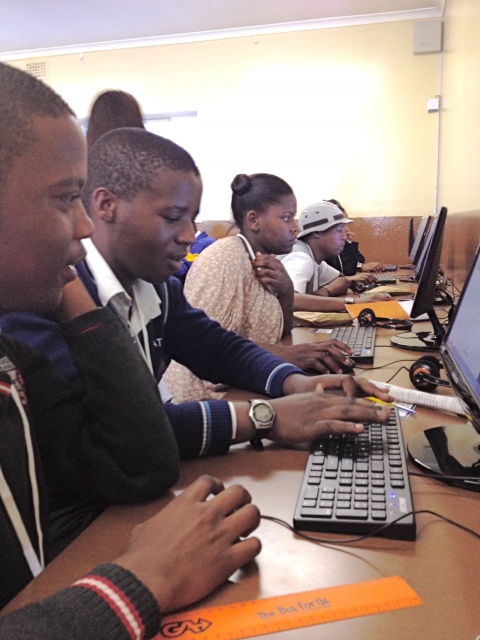
This past Friday finally saw months of preparation and planning for our annual Career Indaba come together in a hugely successful day. Over 1800 students, parents, and community members flooded the Zolani Centre hall in Nyanga to explore their post matric choices and job opportunities.
IkamvaYouth’s founding motto is one of future-oriented thinking and pro-activity. The Careers Indaba is a fundamental step in fostering this mind set in the youth of South Africa. It is challenging to dream of a better future and to aspire to goals without knowing the realities of these goals and the opportunities that are available.

The event was open to high school learners from around Khayelitsha, Nyanga, Masiphumelele and surrounds, who came together to think about their futures and really take their lives into their own hands. They were informed not only about their career options, but also attended workshops on financial literacy by Capitec, and CV writing, interview skills and online CV development through Career Planet.
Over 25 Universities, companies, professionals and NPOs from all over Cape Town attended the Indaba as exhibitors. They did not merely provide factual information about careers and studying opportunities, but they also conversed with these young people and delivered a message of hope and possibility. This message is crucial for youth who are the victims of poor education systems and who live in a community plagued by poverty and all its products: IkamvaYouth focuses on changing the mind-set of youth, to think beyond their immediate circumstances and to believe in themselves and the possibilities that their futures hold.
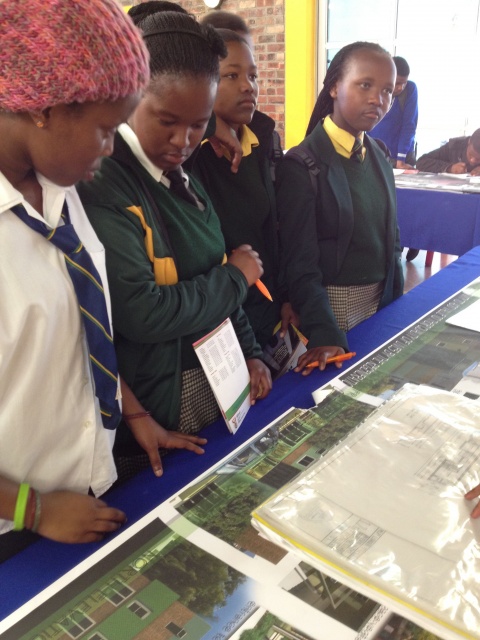
The day was an inspiring success, with many learners and exhibitors commented at how much they had gained from the experience. Axolile, grade 10 from Sizimisle Technical High School said the most important thing he learnt is, ‘to know what you want to be in life and be dedicated, this will for sure get you to be where you want to be. ‘ While Sizalobuhle from Sinako High School said that, ‘ the Career Indaba helped me learn more about my dream career of being a lawyer, where to study and how to get into the best courses and universities. I also found out about how to apply for bursaries, and how to manage my money through the workshops.’
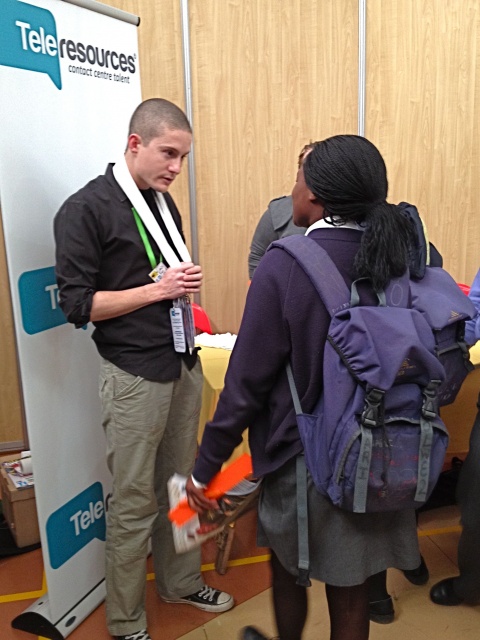
To organize an event of this size we partnered with Equal Education in helping to organize exhibitors and set up the event, and SAEP and the Department of Social Development joined the crew. We are also hugely appreciative to Mxolisi and his team at the Zolani Centre for the use of the hall and surrounding spaces.
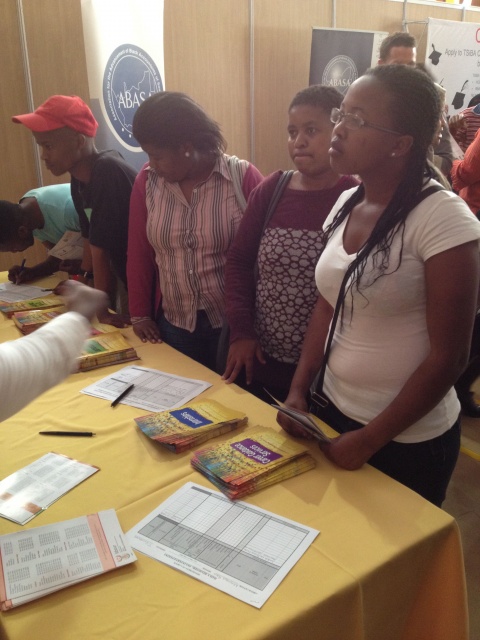
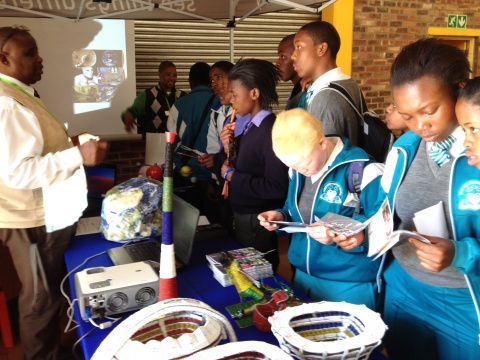
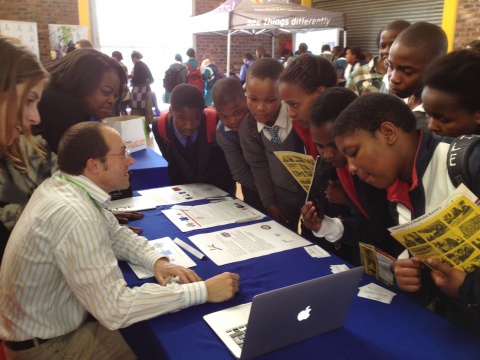
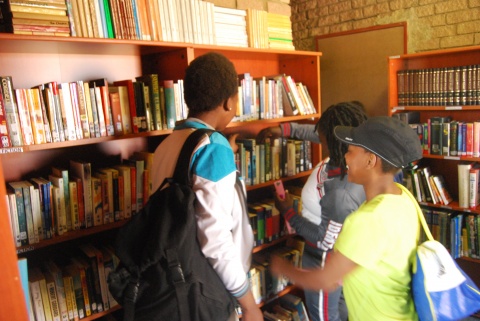
On Saturday, 25 August, Ikamva Youth’s Ebony Park Branch opened it’s own library. It was opened after a ceremony introducing the Ikamvanites to the library and its rules. After watching entertaining videos on the wonder of books, learners made their own bookmarks in anticipation of reading the library’s books. After the ceremony, excited Ikamvanites were allowed to go to the library. For the first time books were taken out of the newly established library. Hopefully this will expose them to the joys of books, establishing a culture of reading at the Ebony Park Branch.

(Ikamvanites deciding which books to take out from the library)
Just over a year ago, Ikamva volunteer Nthabiseng Mokoena realised that the Ikamvanites lacked access to books. After consulting with other volunteers at the Branch, as well as Ikamva employees, she decided to start a library. With a generous donation of book shelves from Robert Barkahuizen, the process of the forming the library began. Nthabiseng, and fellow volunteer Samuel Suttner, collected books from various sources, including family, friends, and fellow Wits’ students. There were considerable donations from Pat Tucker and from the Matla Runners, and assistance from Prof. Bhekizizwe Peterson and the Wits Volunteer Programme.
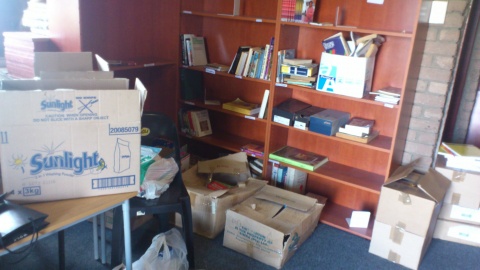
(The library, still a work in progress)
Once the books were collected, the arduous task of setting up a cataloguing system for the library began. With the help of a former librarian, Lucille Katz, and Lucy Verbeek, this was done over many months. They set out the library, categorising and cataloguing the many books
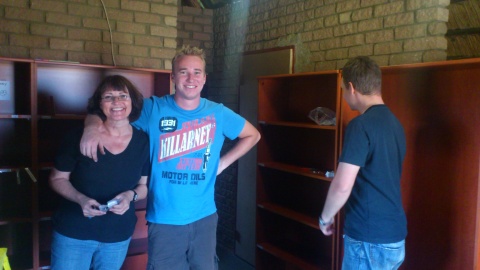
(Lucy Verbeek (left) and her son helping out with the library.)
There was no funding for the library; all the resources for it were donated by people who believed in the importance of having a library for the Ikamvanites. The views of those who assisted with the establishment of the library were expressed by the novelist Zadie Smith: “A lot of people don’t have books on their shelves. The library was the place I went to find out what there was to know. It was absolutely essential.”
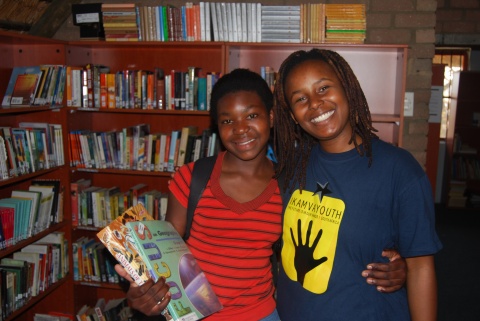
(An Ikamvanite takes out books, with volunteer Nthabiseng Mokoena – right).
We would like to thank the following people for their assistance:
Andrew Barrett; Hlengiwe Radebe; Judy Engela; Karuna Singh; Gill Laburn and the Matla Runners; Lucille Katz; Lucy Verbeek; Nyasha Mutasa; Pat Tucker; Patrick Zimba; Prof. Bhekizizwe Peterson; Robert Barkahuizen; Seth Musker; Stephanie Simpson; Talent Mzili; Thapelo Mokoena; Tiffany Ebrahim; Wits Volunteer Programme, Wits University; Wits Bachelor of Accounting Science, Fourth Year Class of 2012.
Written by Nthabiseng Mokoena and Samuel Suttner

(Listen to the actual debate at http://www.bbc.co.uk/radio/player/p00x8h4d)
Ikamvanites in Gauteng were invited to take part in the BBC Africa Debate at the University of the Witwatersrand on the 31st of August. The question posed was: South Africa at 18- Does black and white still matter in the rainbow nation? (Unfortunately, due to the nature of the topic and the manner in which BBC radio created the racial references, this article will also be using such terms.)
The debate was hosted by BBC radio presenters, Audrey Brown and Karen Allen, and a panel of speakers selected by BBC in an attempt to represent the “Born Free Generation” as people born on or post 1994. The panel was a strategized mix of Black and White persons from St Benedict’s Private School, Pretoria Boy’s High and Wits Students in an attempt to represent “all” youth. The audience consisted of political party representatives, organisations like Ikamva Youth and academics.
The panellists were divided both racially and with their opinions. However, their opinions were not divided according to race as predicted. Throughout the debate, depending on one’s personal background, circles of influence, experiences and current state of affairs, people felt and saw things differently.
Some youth stated that race does still matter and is still used as a form of identifying and relating to people – finding a commonness (based on cultural, linguistic and socio-economic) amongst a diversified crowd and finding it easier to socialise better with people who have the same social backgrounds. Is this based on the fear of rejection and the need for belonging that most humans feel? On the other hand, as highlighted by the presenters, race is possibly merely used as a code to cover up other issues, such as how race is experienced on a social level. It was great to see that after the debate, the IkamvaYouth learners, also Born Free, interacted with people outside of their normal circle – spreading their horizons.
Some of the issues raised involved nationalisation,education and poverty. A poll was raised and showed that the majority of the attendees were against nationalisation. In terms of the economy, some ‘Born Free’ learners argued that the need is for South Africa to focus on the mines and entrepreneurs to grow the national economy in order to develop society. The issue of shared wealth was then raised and with this race dimensions came up again. A majority of the audience share the view that the majority of poor people are black because the majority of South Africans are black and it is an underdeveloped country – hence the poverty. However, many still see it as: Black people are poor because they are black and financial status is a racial issue construed by the past racial injustices.
Most issues that were given attention were national issues. Policies of Apartheid reformation such as Affirmative Action, BEE and the Constitution were brought up and their role in healing the racial divide were questioned. Unemployment and access to equal opportunities is an evident issue that maintains the gap between the rich and poor. With statistics showing that South Africa has overtaken Brazil GINI ratio – wealthiest. White per capita is 8 times more than black per capita.
This shows that real issues facing South Africans are issues of inequality based on many issues with race only being a structural component created by history and inherently inherited.It was largely seen that differences in race still matters only because South Africans make it matter. All the views of participants were forcibly related to racialism and were rarely from a personal experience of injustice. It seems that society continues to insist on segregation economically, linguistically, geographically and ethnically. One of the audience members noted that: ‘the rainbow colours never mix’, maybe it is inherently human nature to distinguish through separation rather than taking advantage of differences to enhance the whole. There is a shared fear of being different because South Africans were once forced to be different based on race only. The question posed was: when will South Africans stop being forced as well as force ourselves to view one another as Black and White?
IkamvaYouth is at the core at tackling these issues and is a community that is aware, wants to be heard and has the power to make a greater change – The views many Ikamvanites have are from a personal and sincere point of view. These views matter and make issues and discussions more linked to the humaneness of the issues people face on their daily lives.

Ikamvanites, Speak Out! Only you can represent your views with the intensity that they should be viewed. If you feel strong about something – Shout!
Thank you IkamvaYouth for showing us that our voice matters!
Written by Kihisha Suleman (Volunteer in charge of Career Guidance at Ebony Park)
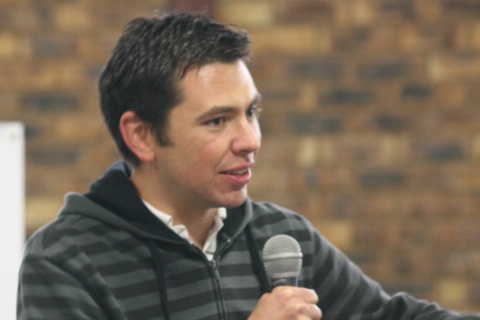

The last day of winter school for the Ebony and Ivory Park branches was filled with mixed emotions. We were sad about the end of winter school, uplifted by the amazing contributions at the talent show, and overwhelmed by a rather daunting part of the programme: “Andrew’s Farewell”. Andrew has been a key ikamvanite since 2009 and his contribution has been so significant that it’s really rather impossible to say goodbye. We have this saying “once an ikamvanite, always an ikamvanite”, and so, rather than bidding Andrew farewell, we spent some time thanking and celebrating him.
Andrew and I first met in 2008, when he became interested in our Operation Fikelela curriculum and its potential use for Siyakhula. He was interested in the IY model, decided to pilot it, and then founded IkamvaYouth Gauteng in 2009. His selfless commitment to realising his vision for the Ebony Park community has been relentless; he has been at every single Saturday tutoring session for three and a half years, and has built not only two branches in Gauteng, but played a key role on natcom, informing who we are and how we do things, and enabling us to become an organisation with a national footprint.
Together with the many learners, tutors and supporters whose efforts he’s inspired and coordinated along the way, Andrew has made an incredible impact. In 2011, the Ebony Park branch achieved a 94% pass rate and 100% post school placement, with 45% at universities, and last year they reached a 100% pass rate and 83% access to tertiary.
Not only has Andrew’s work fundamentally changed the lives of the people he’s worked with, but he has established something that will keep on changing many lives. The individuals who were learners during Andrews time will become the tutors who will support more learners to reach similar heights.
But this work is not easy, and it’s this, even more than the outcomes that I want to thank Andrew for. Andrew has essentially been volunteering for IkamvaYouth all of this time. He has a full-time job running his own NGO, and has sacrificed massive amounts to create this beautiful home for all of us. And he even managed to study and win awards in addition to his two full time jobs! He has sweated the small stuff: filling out attendance, capturing data, making sandwiches and dealing with the un-fun aspects of this work. And he’s also been a visionary leader who’s inspired hundreds of people to change the world.
So I’m not going to say farewell. I know that our organisations will continue to collaborate and that ultimately we are still working together towards the same goal:
The fact that 2 million of the 2.8 million South Africans Not in Education, Employment or Training (NEETS) haven’t passed matric tells us something about how to fix this problem. What IkamvaYouth and Siyakhula are working towards is ensuring that young South Africans don’t become NEETS but rather IETS. (“Iets” means “something” in Afrikaans.)
So what IkamvaYouth and SEF and everyone in that room on the last day of winter school, led by Andrew, is doing, is ensuring that ikamvanites become iets; become something. Ikamvanites become something so great that very soon they can in turn help other learners to become something. And what ikamvanites are going to become and are becoming already, are the leaders of the country. Because the generations before us do not know how to fix this problem. The education crisis is so huge and so massive that they are scared by it. But we do know how to fix it. And instead of wringing our hands and talking about how we need to work together to fix things, we’re getting on with it.
That’s what Andrews been doing for the last 4 years, and, through SEF, is going to continue doing for the next many years, and so this isn’t a goodbye but a huge thank you. For your leadership, your volunteerism, your inspiration, your selflessness, for challenging us, for pushing us, and for sharing all you know with this amazing team of people who will continue with the amazing work you started.
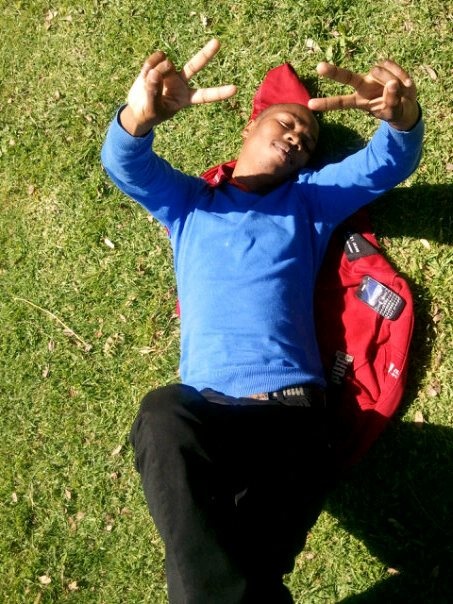
Telling my Story
Time really flies, Its seems like yesterday that I was sitting at the library doing my school work when I meet Joy, Susie, Makhosi and other Ikamvanites tutors.
I started attending IkamvaYouth in 2004 when I was in Grade 11; the year IkamvaYouth was official registered. Ever since then I have been part of the IkamvaYouth family. I joined this amazing organisation because I needed help with my subjects and I wanted to improve my results in order to become eligible to access tertiary studies. I attended high school at Manyano High School around Khayelitsha. At that time I was doing grade 11 and I knew that I needed help to improve my results but I didn’t have money to pay for extra classes. I spent most of my time after school at the library. After joining the IkamvaYouth my results increased, at the end of 2004 I was the top accounting learner at Manyano High School.
In 2005, I came back to IkamvaYouth as a grade 12 learner and continued to work hard on raising my results. 2005 was the difficult year for me. In this year I had to work hard because it was my last year in high school. Before Joining IkamvaYouth university was not something I would ever consider. I knew it very well my family would not be able to afford university tuition. At IkamvaYouth tutors provided us with the pack of information about tuition, loans and bursaries that one can get. They even helped with application money for me and the other learners that needed help.
Growing up in a township is not easy. At a young age you face many challenges, such as peer pressure. You find out some people hate the fact that you go to the library and study. Khayelitsha is one of the townships that struggles most with high rate of crime, HIV/AIDS, dropout at school, low pass rate in Matric, poverty and drug abuse. When you are young, you have to face all of these things. But it’s all about making the right choices. For me I made the right choice by choosing school. I told myself that I wanted to be the role model and be something out of nothing.
I matriculated in 2005 as the dux scholar top most performing student in Manyano High School. I was the top learner at Manyano High school in the following subjects: Mathematics, Accounting, Business and Economics!
I successfully applied at University of the Western Cape (UWC), Tertiary School in Business Administration (Tsiba) and University of Cape Town, with the 1st choice of Bcom General and Bcom Accounting at UCT. I was so excited when I received my provisional accepted letter from University of the Western Cape. The sad part came when I found out that I have to pay upfront payment R4300 as the registration fee. I realised that I had only one option to work hard and get better results so that I could be eligible to get bursary.
On the 28th of December 2005 I got a phone call from my class teacher telling me that I passed. I was in the Eastern Cape that time. I was so excited, but at the same time worried. I was worried about what would happen in the following year because I didn’t have funds for the registration fee.
The following January, I remember I was with Joy and other two learners who were also accepted at University of the Western Cape, none of us had money to pay the registration fee. We were trying to get assistance from the financial aid office and the people were not helping. We moved up and down in long queues NO one was helping and no one was willing to give us registration fees even though we had good results. Joy finally had enough when we got into the financial aid office. She told the lady that was in charge that we not leaving the office until we got help. We showed them our acceptance letter and our good matric results. Then we all seat on the floor since there were no chairs *ha ha ha* After a while, a lady left and came back with 3 forms to fill out. We were told that our registration had been cleared then we can go and register.
That same year I realised that I had to give back to my community. I returned to IkamvaYouth as a tutor. I was tutoring Accounting, Business Economics (Business studies now) and Economics. I was also involved in the branch committee. Giving back to my community as of the things that kept me motivated and working hard in life.
In 2007 I joined another project called Brawam-sisiwam mentoring programme at the University of the Western Cape. I was a mentor to 3 grade 9 learners from Masithembe high School in Phillipi. While I was tutoring at IkamvaYouth I was also a tutor for UWC’s SRC winter classes held in 2006.
I remained a committed volunteer at the IkamvaYouth branch; I also served as the head of the Career Guidance committee. While I was studying I also managed to find time to work part-time as senior computer lab assistance at the University of the Western Cape in 2009 and 2010.
I graduated with Bcom Information systems degree at University of the Western Cape. In March 2011 I started to serve as branch assistant at IkamvaYouth in Makhaza. In the organisation I am the first employee to come through the tutoring programme.
As for my job now…..
I am assisting with general administration and providing assistance to the branch coordinator. Collecting school reports and entering data into database. Communicating and logistics for daily activities, programme delivery and events. Assisting with general lab duties such as printing, photocopying and ensures proper usage and maintenance of the environment. Working with learners is very interesting and challenging at the same time. Managing 160 learners and 40 volunteers/ tutors is not an easiest task to do. One of the things that really help me to do well in my job is that I have experience as a learner and tutor/volunteer. This helps me to relate well with people I am working with.
Since most of our parents didn’t have the opportunity to study, I find for most of the learners IkamvaYouth is the only place where they get the opportunity to get the feedback on their school results. Our learners are between the ages of 13 to 19. At their young age they realise that their future depends on education, this is one the things that motivate me to wake up every day and be in the office to help.




















 Lloyd Lungu
Lloyd Lungu